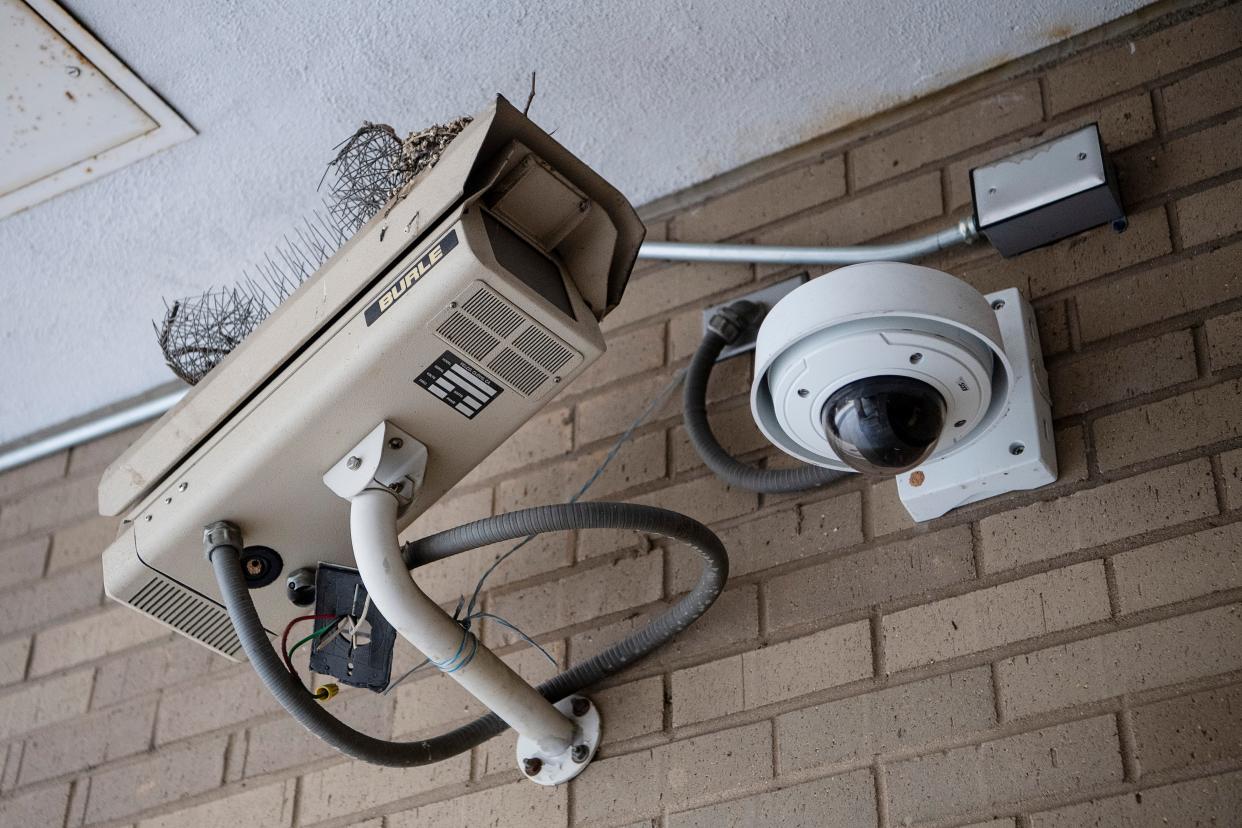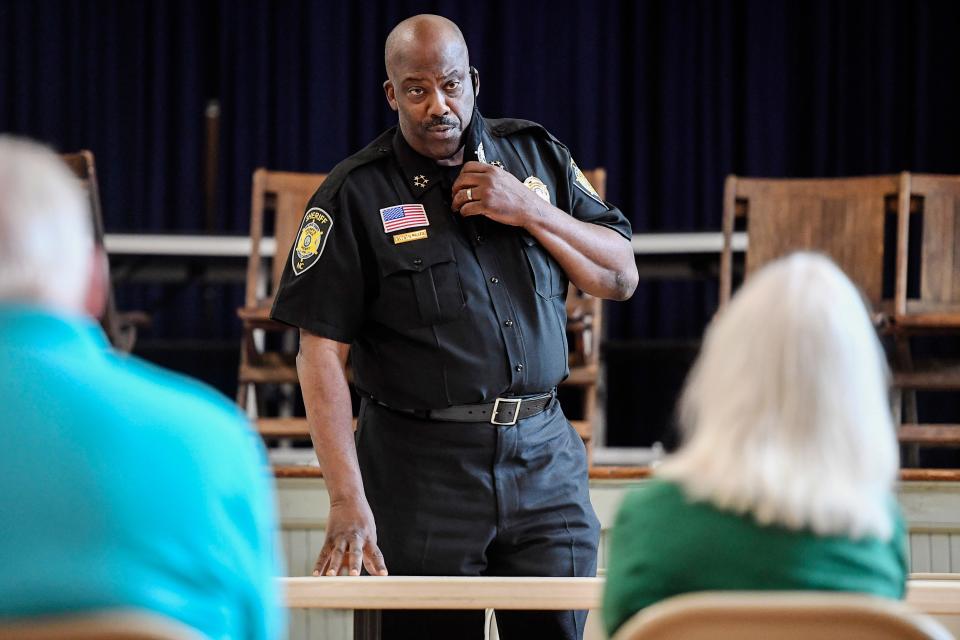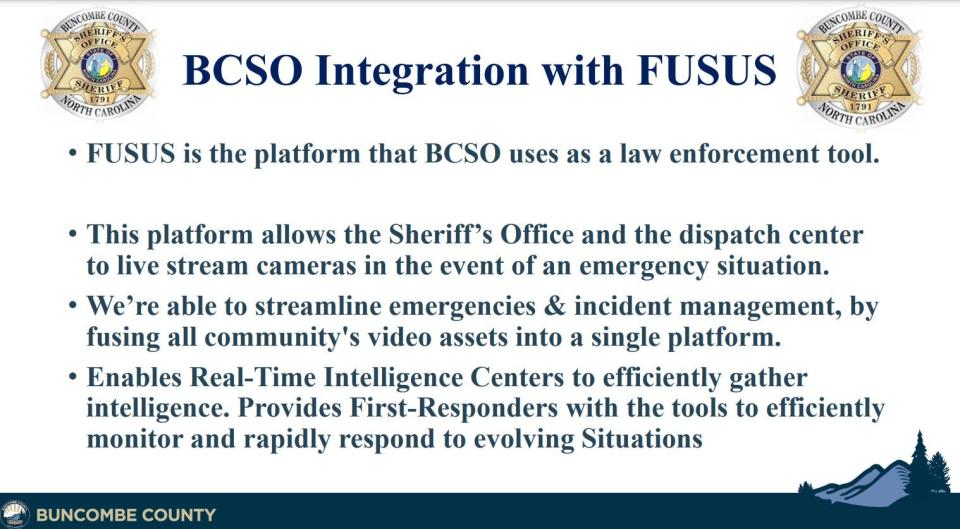2,000-camera network feeding to Sheriff's Office could get bigger this year. Here's why.

ASHEVILLE - Buncombe County's Sheriff's Office's network of about 2,000 cameras throughout the region, which can feed directly onto a centralized monitoring system, may get bigger in 2022.
That's what BCSO investigations administrator Scott Bissinger told Buncombe County Board of Commissioners at its June 7 briefing.
He was talking about a relatively new network of cameras — most in the Buncombe County Schools system — that can feed real-time information to law enforcement.
BCSO doesn't monitor those cameras, Bissinger emphasized, but can have immediate access to them when an alarm is activated.
Part of a Fusus-brand public safety software system, the network includes roughly 1,500 cameras spread out through every county school and is piloting in some city schools, Bissenger said.
Crime news: FBI, Buncombe drug bust: pound of fentanyl, gun, $1,000 seized
The other 500 or so are in housing communities and a few privately owned business also piloting the system.
"The sheriff is trying to move forward to get some downtown coverage," Bissinger told commissioners, heralding a forthcoming BCSO ask to establish a special "enterprise" fund model to support the growing camera network.
Downtown businesses want to be part of the program, he said, and the Sheriff's Office needs a way to manage the fees they would charge for such opt-ins — $60 a year per camera.
After noting the program was voluntary for business owners who want let BCSO use their cameras, Bissinger also said, "We're really just wanting to get the major public areas under camera where we've had some crimes on the sidewalks." He specifically noted the area from the "courthouse corridor all the way Patton Avenue" was a priority.
None of that is complete yet, Bissinger said, noting downtown coverage was "in progress. The sheriff wants to get that under camera."
The system is about a year old and "still in its infancy" said Bissinger, who noted he's been tasked by Sheriff Quentin Miller to bring the Fusus network to fruition.
Spokesperson Aaron Sarver said Bissinger, previously a major and chief deputy under Sheriff Van Duncan, is retired and works part-time for BCSO.
"He has filled a variety of roles under Sheriff Miller and having someone with his experience and knowledge is obviously very helpful."
For subscribers: Stolen catalytic converters: Man in copper wire 'theft ring' had 10, says Buncombe Sheriff
Bissinger's job right now is to figure out how to expand the network for people who want to join. Right now, that includes businesses and state agencies, he said.
BCS, the largest Fusus user, implemented the system in late 2021 and described it in a news release as "a video platform that integrates video streams from camera networks across the school system, creating a unified view in a sheriff’s department command center or on deputies’ phones through a mobile app during a critical emergency."
Fusus can also pinpoint deputies in the field and provide secure communications, the release state.
BCS was the first Western North Carolina school district to use this technology.
Miller: Camera system would have community board
Miller told the Citizen Times on June 8 that the effort isn't about a BCSO effort to expand the camera network. It's about providing a fund to manage fee money that would come in from businesses paying to put their cameras on the system.
"We don't use taxpayer money to fund this, so the challenge is, how do we continue to use the system without there being a cost to the county?" Miller said. "All we were asking (June 7) is, because you have to have a fund for the money to come in, we were asking the commissioner for the ability to have a fund or a place to put the revenue coming in."
Fusus software implemented in other U.S. law enforcement has been likened in some reports to a "Big Brother" system, a constant governmental eye on public activity.
Miller said that's not what this system is about. In fact, he wants the system to be government by the community.
"We're the only sheriff's office in the state that has an advisory board," he said. "And so with that in mind, we also want an advisory board for the Fusus system. What that would mean is that we would have our citizens policing us as we move forward with the system. As we bring it to the community, we want the community to be a part of this growth."

Miller added he wants the Fusus system to be not only governed by a board but also audited so that the board can know exactly how law enforcement is using it.
"Public safety is not just the sheriff's job," Miller said. "It our job to working together to keep each other safe."
A 'self-sufficient' surveillance system
Bissinger was before commissioners June 7 to preview a forthcoming BCSO request that would allow this system of cameras and law enforcement tracking software to evolve.
Namely, the department wants to establish an enterprise fund for a the department's growing "real time intelligence center," allowing businesses or other organizations to connect to the system at a cost.
That fund will be under county management, but it won't use taxpayer money, according to BCSO Business Manager Lynn Smith.
"That's just going to allow us to make additional purchases for equipment as we move through the city and do more partnership," Smith said. "That fund will allow us to do things that we need to do without additional cost to the taxpayers."
Prompted by Commission Chair Brownie Newman to explain more about how an enterprise fund works, Smith said there will be a flat fee per camera per year for businesses that want to participate in the system.
That fee would be $60 a camera, according to County Manager Avril Pinder, who noted the fund would be "self-sufficient."
"That money will be used to work with expansions ... within our real time intelligence center without there being any additional cost that we're having to come to commissioners or budgeting for that fund," Smith said.
Information about the system and BCSO's plan to grow it was met with questions and some trepidation from the board.
Commissioner Jasmine Beach-Ferrara asked how such a system could potentially aid in an active school shooter situation.
"We don't ever want to think about it," she said, "but in the incident of an active shooter situation, how would this be used relative to what's happening on the ground at the scene?"
Noting how the Fusus system was used to track a suspect during a deadly 2021 Winston-Salem school shooting, Bissinger explained different ways the technology feeds back to law enforcement.
"We can see the floor plan. We can tell the officer what hallway the incident is occurring in. We can describe to them which direction to go. We can see those officers moving through the school, possibly send them photographs or even a live feed," Bissinger said.
He noted teachers can livestream the incident through a Fusus-brand smartphone application if necessary.

It also currently allows system administrators to see video from three days back at most, Bissinger said.
"The benefit of what you're talking about are kind of self-evident, and I think having them in schools and places like that makes sense," Newman said, but he expressed concerns about the broader implications of having a network of public-facing cameras.
"Do we need to have a broader conversation about the degree to what we want with these in general public places?"
Bissinger said the city had "identified" needs for cameras in downtown areas — Asheville Police Department was deeply involved with Fusus network establishment, he said.
If the county was going to support a fund for the program, Newman said, he'd want to have a more thorough discussion.
"Keep in mind," Bissinger said, "that 99.9% of cameras that come on the system, they're already there."
People are voluntarily allowing this kind of surveillance.
Private property surveillance was one thing, Newman said. Public surveillance was another.
"I would definitely want more information on that," Newman said. "I think there are just legitimate tradeoffs here between the security benefits of this and public privacy, frankly. If you go out in public, you're in public. There are certain expectation that go along with that."
Beach-Ferrara also said she wanted more information about the system.
"I think I would just echo wanting to have a clearer understanding of the parameters and some of the constitutional issues at play regarding public resources being used essentially for surveillance in public areas," she said.
"When I met with the sheriff (the camera network) was described as a program for within the schools, not sort of a broader community surveillance imitative," Newman said, calling for more public input opportunities if it were to move forward.
Commissioner Robert Pressley said he'd seen the system work in real-time.
"While I was there and they were showing me the camera, there was an incident in the west of the county," he said. He watched law enforcement respond and said the experience was "real interesting."
Andrew Jones is Buncombe County government and health care reporter for the Asheville Citizen Times, part of the USA TODAY Network. Reach him at @arjonesreports on Facebook and Twitter, 828-226-6203 or arjones@citizentimes.com. Please help support this type of journalism with a subscription to the Citizen Times.
This article originally appeared on Asheville Citizen Times: BCSO seeks a way to manage fee system for growing 2K-camera network


